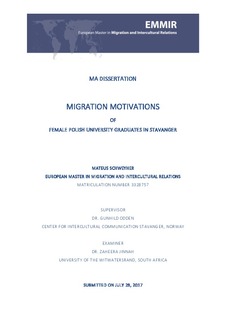Migration Motivations of Female Polish University Graduates in Norway
Master thesis
Permanent lenke
http://hdl.handle.net/11250/2459509Utgivelsesdato
2017-07-28Metadata
Vis full innførselSamlinger
- Studentoppgaver (HF-IGIS) [1059]
Sammendrag
Polish migration to Western Europe is often perceived as economically motivated labor migration. Scientific accounts of Polish migration to Norway have contributed to this understanding by employing economic models of migration to explain contemporary intra-European east-west migration and focusing on particular groups of migrants. Little research has been conducted about migration motivations of highly educated Poles migrating to Norway. Based on narrative interviews this research explores the migration motivations of six female university graduates from Poland living in Stavanger, a city in the south west of Norway. The research focuses on individuals’ perspectives on migration decision making and follows the research question: Why do Polish university graduates come to Norway and what are their considerations about future mobility? The study revealed very diverse motivations for migration from Poland to Norway, i.e. adventure seeking, aspirations for a change in life, independence from family well as family considerations. In some cases, these aspirations correlated with economic considerations in other cases economic motives were almost absent. Social networks played a crucial role in stimulating migration and in directing migrants to Stavanger. Considerations about settlement, return and remigration revealed that migrants were very satisfied with their lives in Norway. They had been able to attain various goals of economic and non-economic nature and were satisfied with their situation at work, their lifestyle and social lives and thus intended to remain in Norway in the near future. Yet most informants refrained from making long term plans since they had a strong sense of uncertainty about the future. They perceived their situation in Norway as temporary and open-ended. The strongest factor holding migrants in Norway was their family situation. Informants in permanent partnerships or with children appeared to have settled more or less permanently in Norway and did not aspire to return or re-migrate. Younger single migrants were still very mobile between Poland and Norway and considering return an option. The study contributes to a more detailed understanding of migration motivations of highly educated Poles coming to Norway and their aspirations for the future. However, there is an urgent need for further research on issues concerning this group.
Beskrivelse
Master's thesis in Migration and Intercultural Relations
